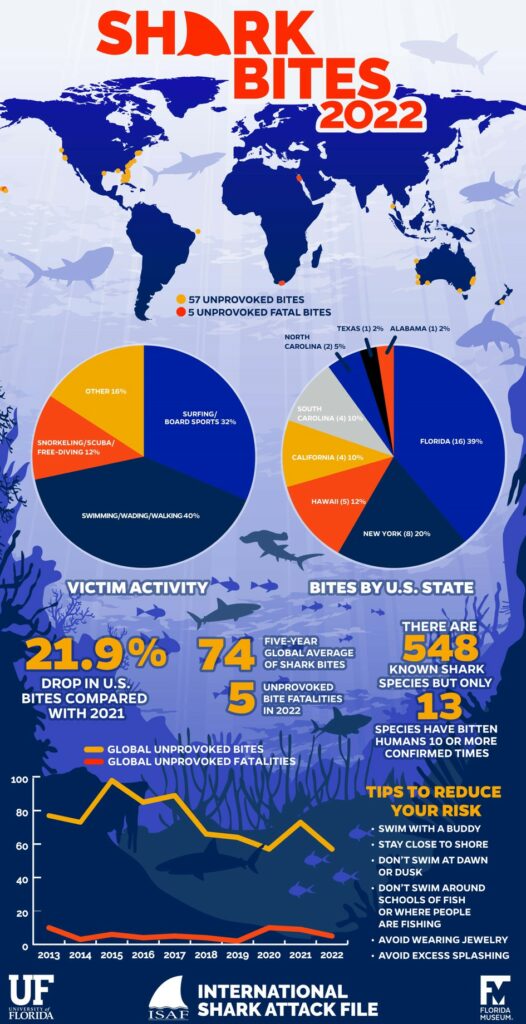Last year saw a decrease in the worldwide number of unprovoked shark attacks, matching the lowest reported incidents in the past decade, which was also seen in 2020.
The University of Florida’s International Shark Attack File reports that in 2022, 57 unprovoked shark bites took place, primarily in the United States and Australia. Out of these, only 5 resulted in fatalities, a decrease from 9 deaths in 2021 and 10 in the preceding year.
There have been an average of 74 unprovoked bites every year since 2013. 2020 was a significant exception, with COVID-19-related travel restrictions and beach closures likely resulting in fewer human-shark interactions. The overall decrease in the number of bites last year might be attributed to the reported worldwide drop in shark populations.
According to Gavin Naylor, director of the Florida Program for Shark Research at the Florida Museum of Natural History, “the number of sharks in the world’s oceans has decreased, which may have contributed to recent lulls.
“It’s likely that fatalities are down because some areas have recently implemented rigorous beach safety protocols, especially in Australia.”
The International Shark Attack File’s annual report places a significant emphasis on unprovoked bites, disregarding incidents that may have been caused by mitigating factors, such as fishing lines or chum in the water. In 2022, there were 32 additional bites that met the ISAF’s criteria for being provoked, either intentionally or unintentionally.
When it comes to understanding shark biology and behavior, “unprovoked bites” provide us much more knowledge, as Naylor put it.
“Changing the environment such that sharks are drawn to the area in search of their natural food source might prompt them to bite humans when they otherwise wouldn’t.”
Similar to past years, the highest number of bites was reported in the U.S., with Florida leading the world in reported bites. Of the 16 unprovoked bites in Florida, none resulted in fatalities, however, two required medical treatment with amputations, suspected to be caused by bull sharks.
An unusual incident took place in the Dry Tortugas where a woman snorkeling was bitten by a lemon shark, a species that rarely attacks humans. This marked only the 11th known unprovoked attack by a lemon shark.
The only unprovoked death in the U.S. was a snorkeler who went missing on Keawakapu Beach in Maui, Hawaii, at the end of the year.
A single bite happened in New Zealand, Thailand, and Brazil, while there were nine confirmed unprovoked bites in Australia. In the Red Sea off the coast of Egypt, where shark encounters are regarded as rare, there were two deadly attacks. In 2022, white sharks were likely responsible for two fatal attacks in South Africa, a country that normally sees just a few bites each year.
Despite the fact that there were fewer bites last year, several local residents and government authorities have expressed worry due to an increase in isolated cases.
New York saw a record-breaking 8 bites in 2022, with 6 confirmed, compared to the previous 12 reported unprovoked bites in the state.
In 2016, scientists found that young sand tiger sharks (Carcharias taurus) had moved into Great South Bay, which is between Long Island and Fire Island. The enclosed harbor is still used by the sharks as a nursery because it offers them more protection from predators than the open ocean does.
Naylor speculates that the abundance of baitfish in the surf zone on Long Island is what attracted the sand tiger sharks responsible for most of the attacks.
“The Gulf Stream’s eddies ebb and flow each year. Sometimes they can come very close to shore, bringing nutrients and fish with them. The juvenile sand tigers will follow the fish, which in some cases leads to an uptick in encounters with people,” he points out. “But local perceptions of shark bites rarely map to global statistics. If you zoom out, these eddies unpredictably break off from oceanic currents all over the world in haphazard ways.”
As far back as records go, no one has ever been killed by a sand tiger, however juveniles have been blamed for several non-fatal attacks.
“Juveniles tend to be more experimental and will try things that an adult shark wouldn’t,” explains Naylor. “If fish are especially dense where people are swimming and visibility is poor, then it is more likely that young sharks, which lack the experience of older animals, will mistake a swimmer’s foot for their intended prey.”
On January 8, 2022, two incidents in the Red Sea off the coast of Egypt resulted in two deaths. The attacks happened less than a mile apart and may have been done by the same shark, which at first was thought to be a mako (Isurus oxyrinchus). It’s not clear yet what kind of shark bit the people, but the shape and color of the fins suggest it might have been a tiger shark (Galeocerdo cuvier).
Shark attacks are not common in the Red Sea, but when they do happen, they often result in death, according to Naylor. This is mostly caused by the area’s distinctive geography. About 50 million years ago, the tectonic plates beneath Africa and Arabia started to separate, leaving a sharp gash between them. This is when the Red Sea first started to emerge.
“It’s a very unusual marine system because the seafloor drops so precipitously, as much as 1,000 feet in 100 yards in some places,” Naylor adds.
According to Naylor, in regions such as eastern North America where the continental shelf slopes gradually, large pelagic sharks tend to stay far from the coast. However, in the Red Sea, they are found close to the shore, mere meters away.
“Open oceans are often pretty bleak, and the pelagic sharks that live in them make their living by opportunism. Whatever potential food source they find, they’ll sample.”
The odds of getting bit by a shark are still very low. There are higher dangers to beachgoers from natural coastal phenomena like rip tides and strong currents than there are from sharks, as reported by the World Health Organization.
Shark Bite Watch 2022: A Geographical and Statistical Snapshot

Image Credit: Getty
